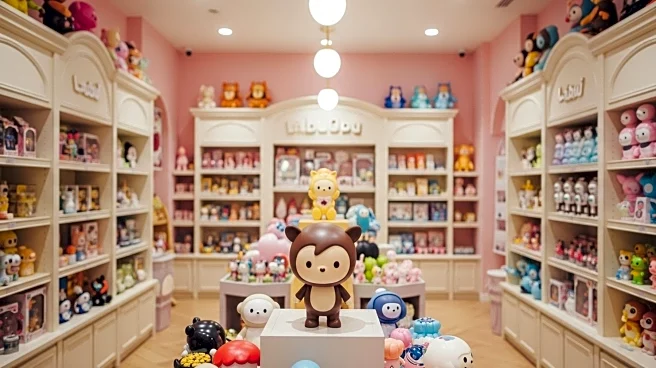What's Happening?
Pop Mart, the Chinese company known for its popular monster toy Labubu, is experiencing a significant shift in the secondary market for its products. Labubu, which gained global attention for its unique design and high resale value, saw some editions selling for over 2,000% above retail prices. Recently, however, the resale market has cooled, with prices dropping by half or more. Pop Mart has expressed satisfaction with this trend, emphasizing their desire to make their products accessible to genuine fans rather than those seeking profit. The company believes that focusing on customer connection and the joy of art is crucial for long-term success. Ashley Dudarenok, founder of China research firm ChoZan, noted that while high resale prices initially boosted Labubu's popularity, they could alienate loyal customers, prompting Pop Mart to shift towards a more sustainable business model.
Why It's Important?
The decline in Labubu's resale prices marks a strategic pivot for Pop Mart, aiming to balance market demand with customer satisfaction. By discouraging speculative buying, Pop Mart seeks to cultivate a loyal customer base that appreciates the artistic value of its products. This approach could lead to a more stable and sustainable business model, reducing volatility in the secondary market. The move also highlights broader trends in consumer goods, where companies are increasingly prioritizing authentic customer engagement over short-term profit. This shift could influence other businesses in the collectibles industry to reassess their strategies, potentially impacting market dynamics and consumer behavior.
What's Next?
Pop Mart's decision to embrace lower resale prices may lead to changes in how the company markets and distributes its products. As the company focuses on genuine customer engagement, it may implement strategies to enhance direct sales and customer loyalty programs. Additionally, other companies in the collectibles market might observe Pop Mart's approach and consider similar strategies to ensure long-term sustainability. Stakeholders, including investors and industry analysts, will likely monitor these developments to assess their impact on Pop Mart's market position and financial performance.
Beyond the Headlines
The shift in Pop Mart's strategy reflects broader cultural and ethical considerations in the consumer goods industry. By prioritizing accessibility and genuine customer connection, Pop Mart is addressing concerns about the commodification of art and the potential alienation of true fans. This approach may encourage a reevaluation of business practices across the industry, promoting a more inclusive and community-focused market environment. The long-term implications could include a shift towards valuing artistic integrity and customer loyalty over speculative profit.










